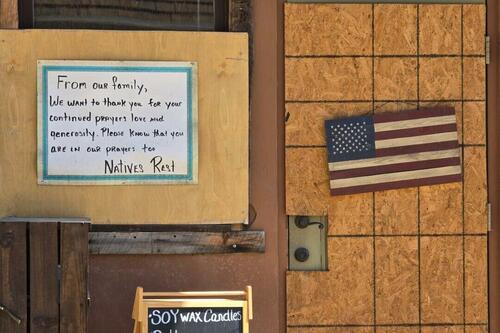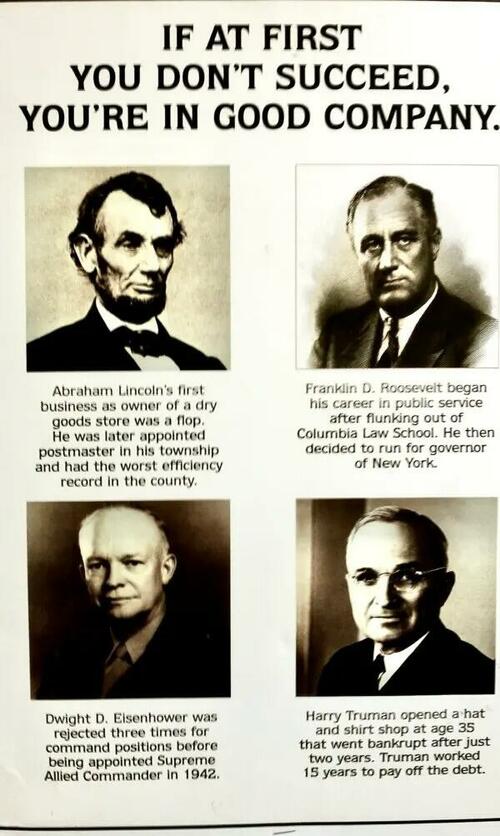The Day I Understood The American Spirit
Authored by Kay Rubacek via The Epoch Times,
I didn’t grow up with Thanksgiving. I grew up in Australia, a place that prides itself on being relaxed and irreverent, where national icons range from crocodile wrestlers to movie stars with casual, sun-soaked charisma.
Our culture is fun-loving and independent, summed up in the phrase, “she’ll be right, mate.” It means: don’t fuss, don’t interfere, everyone handles their own problems. It isn’t unkindness; it’s distance. You stay in your lane; others stay in theirs.
Thanksgiving wasn’t part of my world. What I grew up with was a steady, unquestioned criticism of Americans. In art school in Sydney, we were encouraged to enjoy American movies and brands while criticizing Americans as arrogant or self-important. It was such an accepted narrative that no one seemed to ask where it had even come from.
In 2010, when I told friends I was moving my young family to the United States, more than one warned me, almost nervously, “Be careful, you might become like an American.”
I didn’t know what they meant. Why would becoming like an American be a threat?
It wasn’t until years later—after researching the Chinese Communist Party’s global soft-power campaigns and the broader network of anti-American messaging pushed by modern ideological actors—that I understood how much of the world’s casual disdain for Americans had been cultivated.
If you can weaken the idea of America, you weaken the country. And much of the world has absorbed that message without ever meeting the people it is supposed to condemn.
But everything I had been taught about Americans dissolved as soon as I arrived in New York.
My first weeks in Manhattan were exhilaratingly loud, fast, and disorienting, as one would expect. I carried a huge paper map (this was before smartphones with a built-in GPS were universal), turning it around helplessly at street corners. And every single time, someone stopped. “Where do you need to go?” They weren’t looking for conversation. They were already halfway down the block before I finished saying thank you. But they couldn’t walk past someone who clearly needed help.
The impact was even stronger for me when I returned for the next visit with my infant son. He was 11 months old and still in a stroller. Whenever I reached the top or bottom of a long subway staircase with no elevator in sight, juggling bags and a baby, someone always stepped in without hesitation. Every time. Not once did I even ask.
The contrast with Sydney was stark. I remembered navigating the city’s financial district with a stroller and heavy bags, standing at the foot of steep train-station steps as people streamed past. Not a single person stopped, even when I tried to meet someone’s eye, hoping for help. Australians are good people, but the cultural default is: you’ll figure it out. It’s not cruelty. Just a belief that everyone should manage their own load.
Americans, by contrast, have a reflexive generosity that is hard to describe until you experience it. Not chatty, not sentimental, just instinctive help, given without ceremony.
I saw the cultural difference again when my children entered New York’s public schools. The system was far from perfect even back then, but I remember walking the hallway and seeing a poster of U.S. presidents listing not their successes but their failures. The message was simple: failure is part of the journey. Everyone falls before they rise. I remember thinking: This is what I want my children to learn. I took a quick photo of that poster and shared it with Australian friends as one of many examples of positive American life. I’ve kept that image till this day.
Courtesy of Kay Rubacek
In Australia, we have “tall poppy syndrome,” where anyone who stands out too much is cut down. Don’t shine too brightly. Don’t be too confident. America, for all its imperfections, teaches something different: resilience, optimism, and the belief that effort matters more than embarrassment.
What surprised me most, though, was how naturally Americans practice gratitude. I didn’t understand its cultural weight until Thanksgiving.
Growing up, Christmas was my favorite holiday, but after coming to America, Thanksgiving very soon became the day I loved most. There is no pressure to buy gifts; no commercial frenzy. Just a meal, some company, and the simple act of acknowledging what is good.
It took me time to recognize how rare this is. Most nations unify through ancestry, monarchy, grievance, or shared struggle. America unifies through something else entirely: a civic ritual of gratitude. Gratitude is not just a personal virtue here—it is part of the national identity. And that identity, I’ve come to believe, is one of America’s greatest strengths.
As I traveled through more than half the states, I saw enormous diversity—cultural, political, economic—but also a consistent thread of generosity and warmth. Americans can be insulated from the geopolitical hostility that targets their nation, and that may be quite a good thing. Many don’t realize how deeply anti-American narratives have been embedded worldwide. But on the ground (and leaving political divides aside), I have encountered more kindness here than in any other country I’ve ever lived in or visited.
I didn’t move to the United States expecting to stay permanently. I didn’t know what kind of life it would offer my children. But slowly, through these everyday experiences, I began to see what makes America truly different. And Thanksgiving embodies it.
It is not about the Pilgrims, or food, or travel logistics. It is the annual reminder that American identity is built on gratitude: gratitude for freedom, for opportunity, for community, and for the chance to begin again. It asks for nothing but humility. It invites everyone, regardless of background, into a shared moment of thanks.
As an immigrant, that matters deeply to me. Gratitude softens division; it tempers cynicism. It reminds us that liberty is not automatic. And it teaches children—my children—that life’s value isn’t measured only by achievement but by appreciation.
Fifteen years ago, I came to the United States, unsure of how long we would stay. Today, when I sit at a Thanksgiving table, I understand something that I never saw from a distance: gratitude is the strong force that holds this country together. It is what makes America generous. It is what makes America resilient. And it is what makes America home.
I didn’t come to America for Thanksgiving. But Thanksgiving is one of the reasons I stayed.
Views expressed in this article are opinions of the author and do not necessarily reflect the views of The Epoch Times or ZeroHedge.
Tyler Durden
Thu, 11/27/2025 – 21:30ZeroHedge NewsRead More






 R1
R1
 T1
T1


